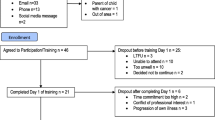Abstract
Purpose
Volunteers from Peter MacCallum Cancer Centre (Peter Mac) Patient Information and Support Centre (PISC) assist the Cancer Support Nurse by helping patients and families/carers find information and provide face-to-face peer support. Benefits of shared personal experiences between volunteer and patient are clearly different from professional support. Volunteers require specific skill sets and detailed preparation for this role.
Materials and methods
Volunteers completed a 3-day training programme adapted from the Cancer Council Victoria’s ‘Cancer Connect Telephone Peer Support Volunteer’ training programme. The focus was role expectations and boundaries for peer support volunteers, debriefing, communication skills training, support services, complementary and alternative therapies and internet information. Assessment included a quiz and observation for a range of competencies. Role-play with simulated patients developed appropriate support skills.
Results
Eight volunteers participated. Pre-training questionnaires revealed all volunteers highly self-rated existing skills supporting people affected by cancer. During training, volunteers recognised these skills were inadequate. All agreed that role-play using an actor as a ‘simulated patient’ helped develop communication skills; however, the experience proved challenging. Post-training all reported increased knowledge of role definition and boundaries, supportive communication skills, supports available for patients and families/carers and importance of self-care. Facilitators recommended seven of the eight participants be accredited PISC Peer Support Volunteers. One volunteer was assessed unsuitable for consistently overstepping the boundaries of the peer support role and withdrew from training.
Conclusion
Success of the programme resulted in a trained ‘face-to-face peer support volunteer’ group better equipped for their role. Sixteen months following training, all who completed the programme remain active volunteers in the PISC. Planned educational updates include needs identified by the volunteers. The training programme would require adapting for future peer support volunteers.
Similar content being viewed by others
References
Ankam K (2006) Use of information sources by cancer patients: results of a systematic review of the research literature. Information research 11 paper 254. http://InformationR.net/ir/11-3/paper.html
Butow PN, MacLean M, Dunn SM, Tattersall MHN, Boyer MJ (1997) The dynamics of change: cancer patients’ preferences for information, involvement and support. Ann Oncol 8:857–863
Dunn J, Steginga S, Rosoman N, Millichap D (2003) A review of peer support in the context of cancer. J Psychosoc Oncol 21:55–67
Girgis A, Hansen V, Goldstein D (2009) Are Australian oncology health professionals burning out? A view from the trenches. Eur J Cancer 45:393–399
Hall SE, Marshall K (1996) Enhancing volunteer effectiveness: a didactic and experiential workshop. Am J Hospice Palliat Care 13:24–27
Hoey L, Ieropoli SC, White VM, Jefford M (2008) Systematic review of peer-support programs for people with cancer. Patient Educ Couns 70:315–337
Klemm P, Wheeler E (2005) Cancer caregivers online. Hope, emotional roller coaster, and physical/emotional/psychological responses. Comput Inform Nurs 23:38–45
Macvean ML, White VM, Sanson-Fischer R (2008) One-to-one volunteer support programmes for people with cancer: a review of the literature. Patient Educ Couns 70:10–24
Manning DL, Dickens C (2007) Cancer information and support centres: fixing the parts cancer drugs cannot reach. Eur J Cancer Care 16:33–38
Mills ME, Davidson R (2002) Cancer patients’ sources of information: use and quality issues. Psycho-Oncol 11:371–378
Nissim R, Regehr M, Rozmovits L, Rodin G (2009) Transforming the experience of cancer care: a qualitative study of a hospital based volunteer psychosocial support service. Support Care Cancer 17:801–809
Seale C (2006) Gender accommodation in online cancer support groups. Health 10:345–360
Smith C, Dickens C, Edwards S (2005) Provision of information for cancer patients: an appraisal and review. Eur J Cancer Care 14:282–288
Sutherland G, Hegarty S, White V, Coffin J, Jefford M (2007) Development and evaluation of a brief, peer-led communication skills training program for cancer clinicians. Asia-Pac J Clin Oncol 3:207–213
Tilkeridis J, O’Connor L, Pignalosa G, Bramwell M, Jefford M (2005) Patient support for cancer patients. Aust Fam Physician 34:228–289
Volunteering Australia (2009) Definitions and principles of volunteering. http://www.volunteeringaustralia.org
Acknowledgements
Peter MacCallum would like to acknowledge invaluable assistance and support from the Cancer Council Victoria in developing this training programme; The Pratt Foundation for support of Harnessing Inner Strength, the internal psychosocial programme at Peter Mac; Associate Professor Penny Schofield and Ms Annabel Pollard from the Harnessing Inner Strength team for support and comments on the original manuscript and Ms. Anne Franzi-Ford J.P., Manager of Volunteer Services at Peter Mac, for assistance with adapting and co-facilitating the training programme and the PISC volunteers for their participation and support.
Author information
Authors and Affiliations
Corresponding author
Rights and permissions
About this article
Cite this article
Kinnane, N.A., Waters, T. & Aranda, S. Evaluation of a pilot ‘peer support’ training programme for volunteers in a hospital-based cancer information and support centre. Support Care Cancer 19, 81–90 (2011). https://doi.org/10.1007/s00520-009-0791-3
Received:
Accepted:
Published:
Issue Date:
DOI: https://doi.org/10.1007/s00520-009-0791-3




